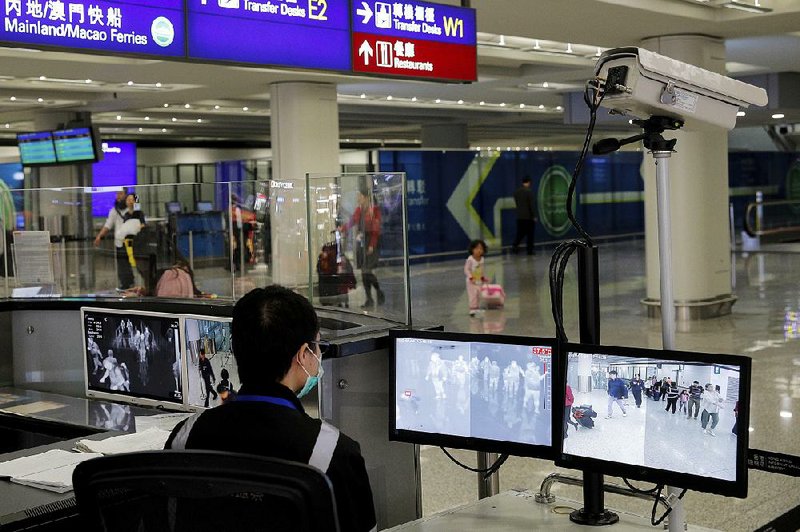NEW YORK -- Three U.S. airports will screen passengers arriving from central China for a new virus that has sickened dozens of people, killed two and prompted worries about an international outbreak, health officials said Friday.
Centers for Disease Control and Prevention officials say they will begin taking temperatures and asking about symptoms of passengers who traveled from the outbreak city of Wuhan.
Officials estimate that roughly 5,000 passengers will go through the process in the next couple of weeks at New York City's Kennedy airport and the Los Angeles and San Francisco airports. The first direct flight was expected Friday night at Kennedy, and the next expected Saturday morning in San Francisco.
Doctors began seeing a new type of viral pneumonia -- fever, cough, difficulty breathing -- in people who worked at or visited a food market in the suburbs of Wuhan late last month. Four more cases have been identified, bringing the total to 45.
Cases of the newly identified coronavirus have been confirmed in Asia, most of them in Wuhan, including two deaths -- at least one involving a previous medical condition. Officials have said the pneumonia probably spread from animals to people but haven't been able to rule out the possibility of human-to-human transmission, which would enable it to spread much faster.
No related cases have been found so far among 763 people who had close contact with those diagnosed with the virus in Wuhan. Of them, 665 have been released and 98 remain under medical observation, the Wuhan health authorities said.
So far, the risk to the American public is deemed to be low, but the CDC wants to be prepared and is taking precautions, the agency's Dr. Martin Cetron said.
"The earlier we detect a case, the better we can protect the public, and the more we can understand about this virus and its risk for spread," he said in a call with reporters.
It's always possible a virus can mutate to become more dangerous. It's also likely that more cases will spring up around the world, including at least one at some point in the United States, said another CDC official, Dr. Nancy Messonnier.
At least a half-dozen countries in Asia have started screening incoming airline passengers from central China. The list includes Thailand and Japan, which together have reported three cases of the disease in people who had come from Wuhan. It is an unusually busy travel period as people take trips to and from China around Lunar New Year, which falls on Saturday this year.
The CDC is sending in 100 staffers to handle the airport screenings. Passengers who seem like they might be infected will undergo testing for flu or other possible causes. The plan is to place them in isolation at a nearby hospital until doctors know what they're dealing with, to prevent possible spread of the new virus. Specialized testing for the virus can take a day for results, CDC officials said.
The agency said the airport screenings are part of an effort to better detect and prevent the virus from the same family of bugs that caused an international outbreaks of SARS and MERS that began in 2002 and 2012.
The CDC did not screen incoming passengers during those outbreaks, and some public health experts questioned whether they should do so now.
"It's not a particularly effective intervention, and it potentially offers a false sense of security," said Dr. Kamran Khan, a University of Toronto researcher who has studied airport screenings during the SARS and Ebola outbreaks.
Screeners probably will flag a lot of people with other germs -- it is flu season -- while missing infections from the new virus. Experts believe it may take up to two weeks between the time someone is infected and when they come down with a fever and other symptoms.
Passengers who don't have symptoms will be handed cards that tell who to contact for health care if they develop symptoms later.
That's important, Khan said. "Educating travelers about the illness and letting them know what to do if they become sick after they leave the airport can be very helpful" because it can speed up proper diagnosis, treatment and isolation precautions, he said.
Health authorities identified the bug this month as a new type of coronavirus. Coronaviruses are a large family of viruses, some of which cause the common cold; others found in bats, camels and other animals have evolved into more severe illnesses.
SARS, or severe acute respiratory syndrome, belongs to the coronavirus family, but Chinese state media say the illness in Wuhan is different from coronaviruses that have been identified in the past. Earlier laboratory tests ruled out SARS and MERS -- Middle East respiratory syndrome -- as well as influenza, bird flu, adenovirus and other common lung-infecting germs.
A Section on 01/19/2020

